Kartell's A.I is a beautiful and ingeniously designed chair that is made entirely of recycled material. A.I (artificial intelligence) is, as its name suggests, a collaboration between man and machine: the injection-moulded chair designed by Philippe Starck was realized with the help of artificial intelligence, thanks to which both production emissions and waste material were minimized. The innovative and quite impressive chair can also be used outdoors.
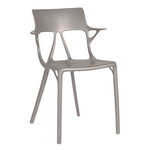
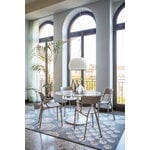
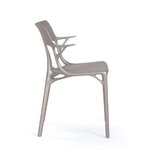
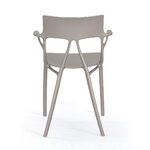
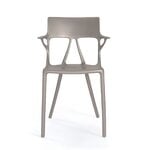
A.I. chair, grey
Kartell
Description
Kartell's A.I is a beautiful and ingeniously designed chair that is made entirely of recycled material. A.I (artificial intelligence) is, as its name suggests, a collaboration between man and machine: the injection-moulded chair designed by Philippe Starck was realized with the help of artificial intelligence, thanks to which both production emissions and waste material were minimized. The innovative and quite impressive chair can also be used outdoors.
Product details (10)
- Colour
- Grey
- Width
- 54 cm
- Depth
- 53 cm
- Height
- 81 cm
- Seat height
- 45 cm
- Armrest height
- 67 cm
- Material
- Recycled thermoplastic technopolymer with mineral filler and Soft-Touch treatment
- Weight
- 3.9 kg
- Notes
- Suitable for outdoor use
- Care instructions
-
Wipe with a soft, damp cloth using liquid soap or detergent diluted in
water
- Product ID
Designer
The french designer Philippe Starck (b. 1949) studied in École Nissim de Camondo in Paris and stayed in Paris after his studies. He became famous for his style and even the president Francois Mitterand asked him to design a suite to his palace. Starck became one of the most famous designers of that time and designed everything from apartment blocks, homes, domestic products and hotels.
In the 80s and 90s Starck started working for Kartell. The cooperation was built on the company’s will to create eco-friendly, contemporary plastic furniture and the designer's particular style. One of the most iconic designs of our time, the transparent Louis Ghost chair, was one of the results of the cooperation with Kartell.
View all productsReviews (0)
Sustainability
The Product Sustainability Framework, our criteria of sustainable design, helps you find the most sustainable products in our selection. Read below which sustainability criteria this product has met.
Working conditions & labour 9/9
-
Equal opportunities for all employees
-
Commitment to UN Global Compact, fair compensation for all employees
-
Corporate responsibility requirements defined and communicated for suppliers
-
Systematic work for improved inclusion and well-being in the workplace
-
Transparent supply chain
-
Suppliers' compliance to a code of conduct ensured
-
Direct suppliers audited and certified
-
Compliance to the UN Guiding Principles on Business and Human Rights ensured in the supply chain
-
Support for community involvement in the supply chain
Eco-friendly production 8/9
-
Fair and resource-wise water-use in production
-
No incineration or landfilling of returned items
-
No use of endangered species as materials
-
No direct environmental emissions or waste (excl. GHGs) from production
-
The sustainability of direct suppliers' production is addressed and monitored
-
Production and material sourcing that respect biodiversity, animal rights, and natural ecosystems
-
Material-efficient and ecological packaging
-
No potentially harmful chemicals used in own production
-
Positive impact on nature’s well-being through operations that regenerate natural ecosystems
Climate impact 4/8
-
Company's direct greenhouse gas emissions identified and commitment to reduction
-
Product's carbon impact identified and commitment to reduction
-
Guidance on energy- and eco-efficient use of the product
-
Contribution to climate initiatives beyond the brand’s direct operations
-
Low-carbon or compensated transportation
-
Carbon footprint of the product calculated and goals set to reduce it
-
100 % renewable energy in own production and operations
-
Carbon neutral or carbon negative product
Sustainable materials 6/6
-
Sustainable and long-lasting material choices
-
No harmful or hazardous substances
-
Responsible raw material sourcing and production
-
Materials suited for circularity: monomaterials, recyclable finishings, renewable or recycled contents etc.
-
Ecological materials: natural, biodegradable, recyclable or recycled contents
-
Outstanding materials in terms of innovativeness, responsibility, sustainability and circularity: local production or sourcing, 100 % recycled content, C2C-certification etc.
Circular design 4/5
-
High aesthetic quality promoting long-term use of the product
-
Technically durable product design and material choices
-
Design for enduring life-long quality
-
Design and support for product maintenance, repair and upgradability
-
Innovative circular design solutions: circular service system, resale platform, remanufacturing, collection of used products, etc.








